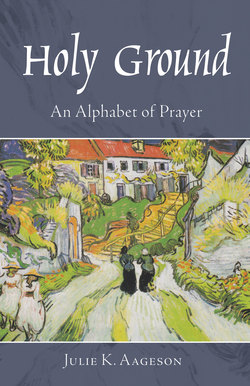Читать книгу Holy Ground - Julie K. Aageson - Страница 12
На сайте Литреса книга снята с продажи.
Devotion
ОглавлениеDevotion as prayer? It’s an odd word with multiple meanings. Its Latin root, devitio, means “total dedication.” It also implies devotional acts—prayers and readings, rituals and practices—for focusing on God’s presence. How might devotion become another lens for looking at the world—an attitude, a posture, another act of prayer?
This morning as I sit at our breakfast table, streams of warm sunshine spill across the room filling the open space with light and a tangible sense of well-being. In the tradition of Christians, I bow my head to offer a prayer of thanks for oatmeal and blueberries, for light and life and the day’s work ahead of me. My Native American friends might dance or drum their devotion. Sufis would whirl their bodies in graceful circles of motion as their habit for expressing devotion. Buddhists likely would sit quietly. Hindus might offer sacrifices. Devote Jews probably would bob their heads back and forth. Showing devotion is to practice dedication and discipline. Devotion honors the gifts of life and makes holy the ordinary ground of ordinary lives. Devotion pulls us away from self-absorption and our ego-centered selves into the overwhelming love and amazing grace of God. The reverence of devotion makes space for the presence of the sacred.
Later in the morning, a dear friend and I spend an hour together catching up with each other’s lives—a phone conversation, a holy discussion. We talk about things that matter and make a difference, issues that enrich our lives. We have known each other for almost fifty years; ours is a devoted friendship. As younger women, we spent hours together discussing thorny theological problems or wresting meaning out of the challenges of our particular stage in life. Now we are grandmothers who discover God’s presence in the presence of one another.
In the afternoon, feeling guilty about the diversions that sometimes take me away from the discipline of writing, I glue myself to my computer and find there another experience of devotion. Writing becomes a devotional act marked by satisfaction and frustration, focus and fervor—“when it was good, it was very good and when it was bad, it was really bad.” Writing becomes a holy deed, a thin place, prayer.
In between these ordinary events, there are exchanges of emails, a moment for watching the fog as it drapes itself across the mountains that preside over my corner of the world, time for working on a satisfying needlepoint project and imagining the next design waiting among my canvases, and the ever-present comfort of books, their siren call and mythic importance so much a part of my own holy ground.
As a child, my family made a habit of evening devotions. It was a way of centering ourselves and coming together to acknowledge our dependence and our need for God’s presence in daily life. Later on when I was away at university, I would visit my grandparents who lived nearby. Rarely did I spend those occasional weekends with my grandparents that we didn’t sit together around their kitchen table for devotions. Their profound faith was evident in the prayers they prayed for each of their grandchildren, for the hurts of the world, and for every other need they felt inclined to share. In their seemingly rock-solid belief in a God who was nearby, a God who took their everyday lives seriously, I learned something about devotion. And in those defining years of my own search for a God I could make sense of, their total dedication made a mark.
Living daily life as an act of devotion can expand our worldview, stretch our imaginations, inspire creativity. Even the ordinary tasks of daily life become extraordinary, worthy of worship and set apart. These experiences of devotion are thin places, described in Celtic mythology as holy spaces where the visible and the invisible world come close, even touch. They are the holy ground of commitment and focus, dedication and perseverance.
Devotion makes more of us. It requires attention and single-mindedness. Devotion is life-giving, invigorating. The discipline of devotion draws us into the living presence of God and transforms our daily lives into prayer.
To what and to whom are you devoted? What is it that so captures your energy and your dedication that it makes more of you? What do you find worthy of dedication? How is devotion a holy act? And how do these acts of devotion shape for you a way of looking at the world, a way of praying? O God, give us the gift of devotion.
REFLECTION
Devotion makes more of us. It requires attention and single-mindedness. Devotion is life-giving, invigorating. It draws us into the living presence of God and transforms our daily lives into prayer.
What is it that so captures your energy and your dedication that it makes more of you?
Name some ways devotion moves us away from self-absorption into God’s overwhelming love, God’s amazing grace.
How does living daily life as an act of devotion expand our worldview, stretch our imaginations, inspire creativity?
Enthusiasm
